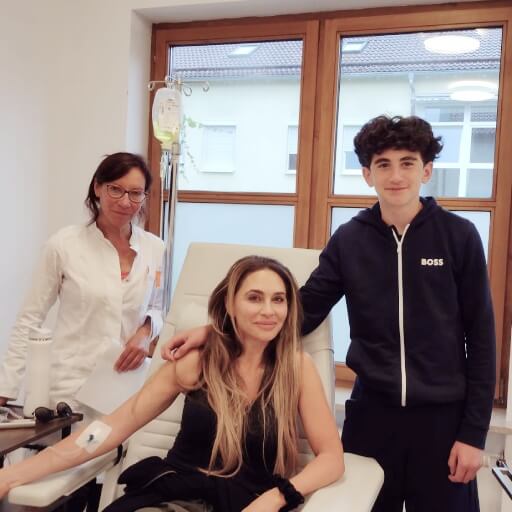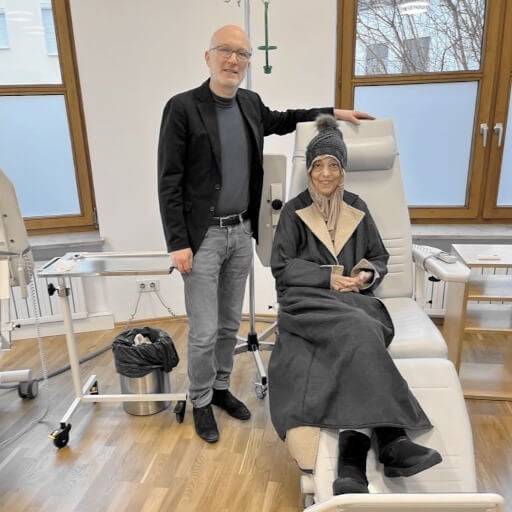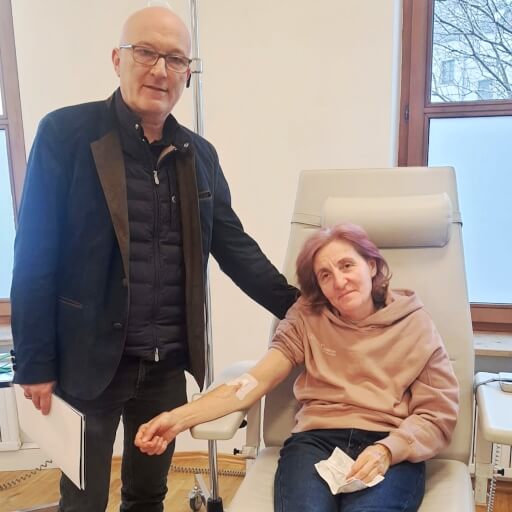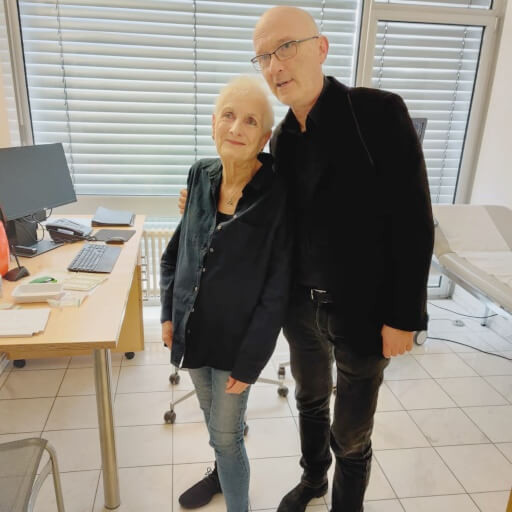Breast cancer (BCa) statistics from the World Health Organization [1] reports that more than 2.3 million women were diagnosed with this disease in 2022. BCa is among the most common and challenging diseases affecting women all around the world. And over 670,000 deaths were attributed to it that year.
But there's reason for hope.
Treatment has come a long way – especially in understanding how cancer cells operate. In particular, researchers have discovered that breast cancer cells can evade immune detection: they can suppress immune responses or disguise themselves as healthy tissue. This understanding has helped develop immune-based therapy approaches that aim to "teach" the immune system to recognize and destroy cancer cells. [2]
Among such strategies, dendritic cells therapy for breast cancer has been recognized as a technique that can benefit patients in several ways. How does it help? It teaches your own immune system to find and attack cancer cells – a focused approach that can improve results for both early-stage and advanced cancer. [2]
Many cancer patients are now incorporating dendritic cell immunotherapy and other innovative breast cancer treatment options into their treatment plans. Currently, this approach is widely offered in Germany. Here patients can access advanced biotechnology and clinical expertise, which allow to improve outcomes.
Dendritic Cell Therapy for Breast Cancer – Mechanism of Work
This is a form of personalized cancer therapy that can reprogram the body's own immune system to recognize and destroy cancer cells. Conventional treatments attack both healthy and cancerous tissue. In contrast, dendritic cell immunotherapy can train the immune system to target only the tumor. As such, it can be considered a highly specific solution for patients with various cancers, including breast cancer. [2-4]
The Role of Dendritic Cells
Dendritic cells are a critical type of immune cells known as antigen-presenting cells. Their primary function is to identify foreign invaders or abnormal tumor cells; break them down into components called tumor antigens; and, then, present these to T-cells, which then become activated to destroy anything displaying those antigens. This training process is the key to fighting cancer naturally. [2, 4]
Once trained, T-cells patrol your bloodstream constantly. They hunt for cancer cells and eliminate them. Here's the best part – these T-cells remember what they learned, providing lasting protection against cancer coming back. [2, 4]
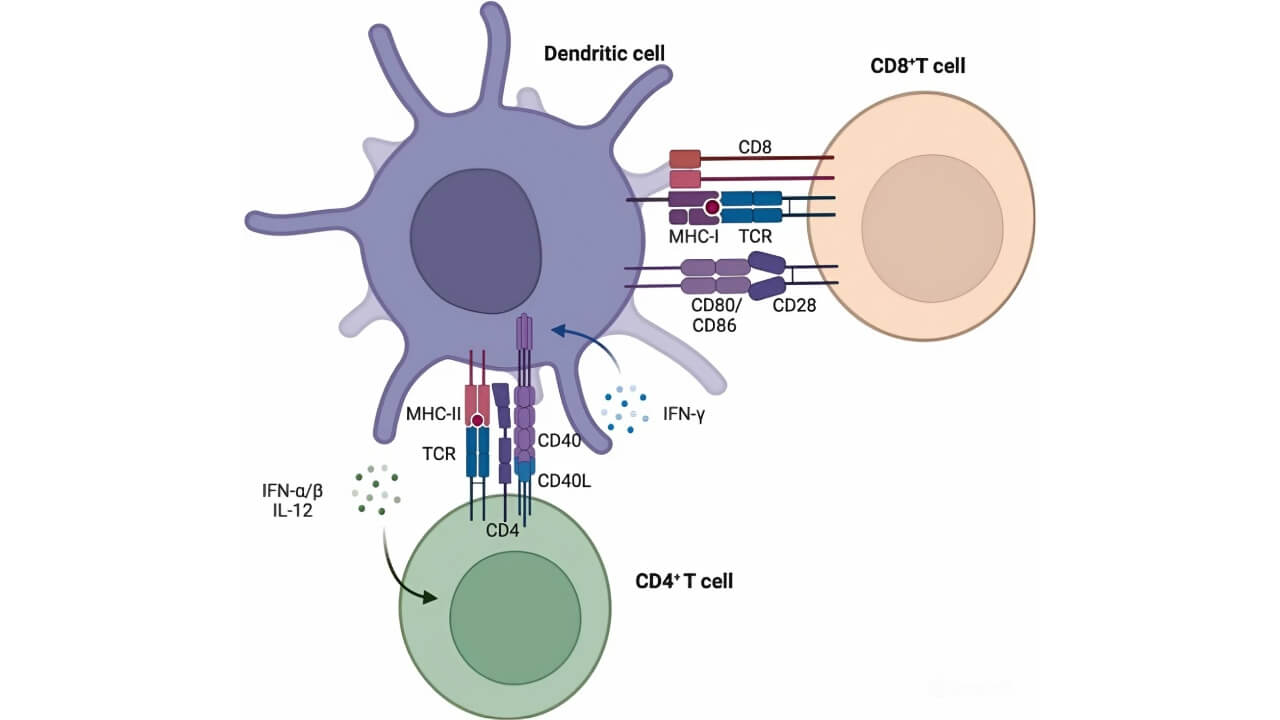
Method That Won the Nobel Prize
A Canadian immunologist Ralph M. Steinman discovered dendritic cells as early as in the 1970s. And in 2011, he received the Nobel Prize in Physiology or Medicine – recognition of a discovery that fundamentally changed how researchers understood immune-based therapy. [2] His findings enabled the development of cancer vaccines – treatments that empower the immune system to eradicate malignancies at their source.
Indications for Dendritic Cell Vaccination in Breast Cancer
Dendritic cell vaccination brings something new to cancer care. It helps both early-stage and advanced breast cancer patients. This personalized treatment boosts your body's ability to spot and destroy cancer cells – especially valuable when standard treatments aren't enough or cause too many problems. [2, 4]
When is Dendritic Cell Therapy Highly Recommended?
After surgery for early-stage breast cancer. Women diagnosed with stages I-II breast cancer often receive a recommendation for dendritic cell vaccination after their operation. Why? The point is that even after removing the primary tumor completely and successfully, some cancer cells might still hide in the body. Studies confirm this risk. DC vaccination tackles this problem head-on: it trains your T-cells to find and eliminate any remaining cancer cells.
For triple-negative cancers. Triple-negative breast cancer (TNBC) is tough as it lacks three key receptors – estrogen, progesterone, and HER2 – and this makes it resistant to many standard treatments. DC vaccination offers a different path. It helps your immune system recognize cancer markers that hormone therapies can't touch.
In cases of metastasis or advanced disease. Advanced breast cancer spreads to distant organs. When this happens, the immune system often becomes worn out or suppressed. Dendritic cell therapy metastatic breast cancer can wake it back up – boosting T-cell activity against cancer cells throughout the body.
For patients with resistance to chemotherapy. Some patients can't handle chemotherapy due to severe side effects. Others develop resistance. For these individuals, this low-toxicity immune approach may offer real benefits.
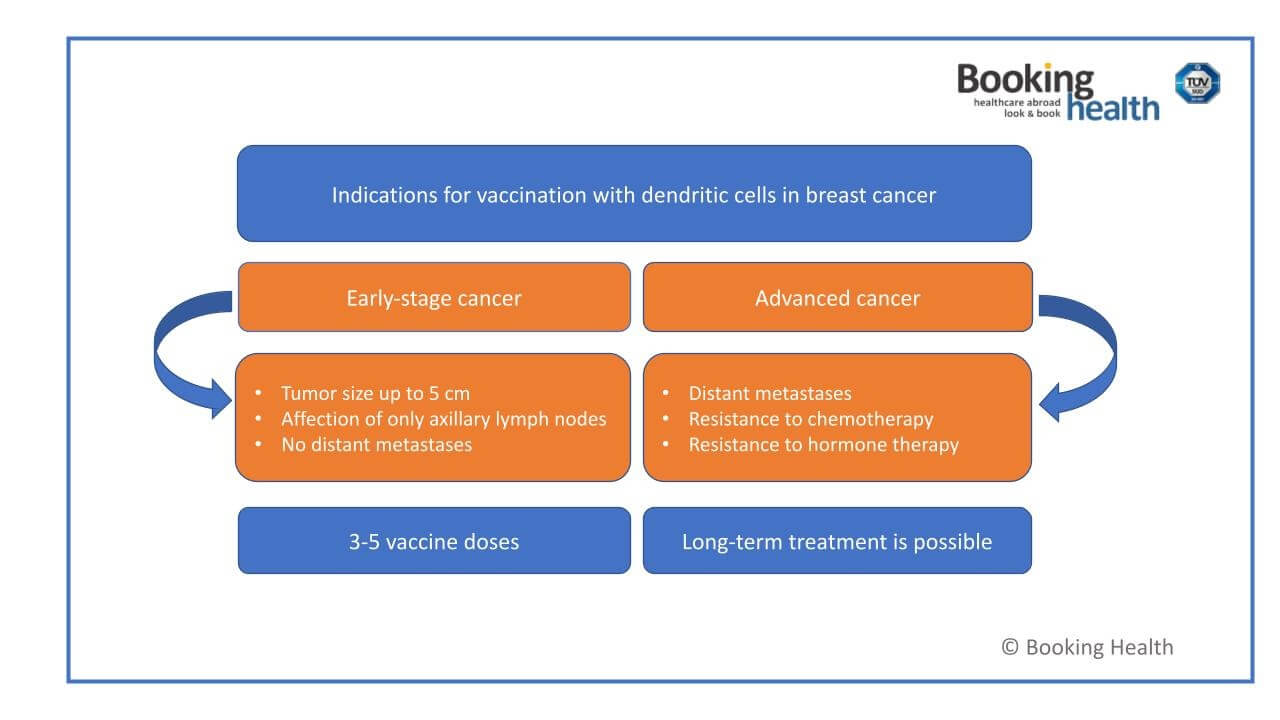
Benefits of Dendritic Cell Breast Cancer Therapy Compared to Conventional Treatments
Standard elements of breast cancer treatment are still surgery, radiation, chemo, and hormone therapy. But each also has limits. Dendritic cell therapy, as novel option, offers low toxicity that leads to fewer side effects and more durable protection against cancer recurrence. [3]
| Treatment | Benefits | Limitations |
|---|---|---|
| Surgery | Removes primary breast tumors | 10-20% risk of local recurrence |
| Chemotherapy | Slows tumor growth, useful in advanced disease | Hair loss, nausea, and immune suppression – up to 30% discontinue treatment |
| Radiation therapy | Reduces local recurrence post-surgery | Long-term skin damage, fatigue |
| Hormone therapy | Improves survival in hormone-positive cancers | Not effective for TNBC; causes menopausal symptoms |
| Targeted therapy | Effective in HER2-positive subtypes | Limited applicability, resistance may develop |
How Dendritic Cell Therapy Differs
Immune-based and personalized. This treatment is custom-made for you. Doctors create your vaccine using antigens from your specific tumor – not someone else's. What does this mean? Your immune system gets precise training: attack these cancer cells, leave healthy tissue alone. It is personalized medicine at work.
T-cell activation. The vaccine sets off a chain reaction in your body. T-cells – your immune system's fighter cells – multiply and gear up for action. They learn to recognize specific markers on cancer cells, then hunt them down. The best part? This anti cancer immunity can last for years.
Low toxicity profile. No hair falling out, no constant nausea, no crushing fatigue, no digestive problems. Patient reports show only minor reactions – some redness or tenderness where the needle goes in. These typically fade within a day or two.
Broad application. Dendritic cell therapy works with other treatments, not against them. It's a team player. Doctors might use it after surgery to stop cancer from returning. Or during advanced stages when chemotherapy stops working. The flexibility matters for cancer patients.
Impact on survival and quality of life. The numbers are striking. Early-stage breast cancer patients who combine this vaccination with surgery see recurrence rates drop by up to 80%. For those with advanced disease? It is longer progression-free survival, better day-to-day wellbeing – real improvements that patients can feel.
Step-by-Step Process of Dendritic Cell Vaccination for Breast Cancer in Germany
As for dendritic cell therapy, breast cancer centers in Germany are the popular destination. The country's cancer clinics follow a highly controlled, scientifically proven process. Each patient receives a personalized vaccine – one custom-built for their specific cancer profile.
Here's what happens at leading immunotherapy centers in Germany.
Step 1: Initial assessment and screening. Your journey starts with a thorough evaluation. Doctors review your diagnosis and the results of examinations, run blood tests, analyze your immune system. Who's a good candidate, so? These are women with triple negative tumors, recurrent cases, those who haven't responded well to standard treatments, metastatic disease.
Step 2: Blood collection. About 200 ml of blood – roughly the amount in a standard blood donation. The collection happens under sterile conditions. Then your blood goes straight to a specialized clean room certified for medical production (called GMP certification).
Step 3: Cell isolation and culturing in the lab. Here's where science gets interesting. Lab technicians spin your blood in a centrifuge to separate different cell layers. Red blood cells? Discarded. Certain white blood cells called granulocytes? Also removed. What stays? The layer containing monocytes and lymphocytes – the building blocks of your personalized vaccine.
After purification, these cells go into a special nutrient bath with growth factors. This triggers their transformation into dendritic cells. But there's one more critical step: adding antigens from your tumor or plasma. This "trains" the cells to recognize your specific cancer – ensuring the vaccine targets your unique cancer profile.
Step 4: Incubation and quality control. The cells grow for 7 days. During this week, they mature into functional dendritic cells. Before DCs are harvested, flow cytometry is used to verify surface markers, cell viability, and count. Only high-quality, immunologically active dendritic cells are used to prepare the final cancer vaccines.
Step 5: Vaccine injection and immune system stimulation. The final dendritic cell vaccine is placed into sterile syringes and administered subcutaneously, typically in the groin region where lymph nodes are densely located. This allows to produce a strong immune system function response, activating cytotoxic T-cells that seek and destroy cancer cells systemically.
Step 6: Post-vaccination – monitoring and support. Patients receive high-dose vitamin infusions to support immune recovery after immunization. Most patients go home the same day – no hospital stay needed. Follow-up appointments track your response through blood tests and imaging.
Professor Gansauge on Dendritic Cell Therapy for Breast Cancer
Want to hear from an expert? Watch this video interview with Professor Dr. Frank Gansauge. He is the founder of LDG Laboratories and a leader in dendritic cell immunotherapy in Germany. Professor Gansauge has over 22 years of clinical experience.
The interview covers how dendritic cell therapy is transforming breast cancer treatment – and why it's considered one of the most advanced innovations in cancer immunotherapy today.
Send request for dendritic cell vaccination
Prof. Dr. Frank Gansauge on the Future of Dendritic Cell Therapy
Effectiveness and Real-World Outcomes of DC Therapy for Breast Cancer
Clinical studies prove what patients experience firsthand: dendritic cell vaccines work. They activate your T-cells to hunt down and destroy cancer cells – a targeted approach that has transformed outcomes for many breast cancer patients, including those with metastatic disease or who've run out of conventional options.
What the Data Shows
Survival and recurrence rates. In a phase II clinical trial published in Therapeutic Advances in Medical Oncology, HER2-negative breast cancer patients who received dendritic cell vaccines alongside neoadjuvant chemotherapy showed a threefold increase in pathologic complete response (tpCR) rates – 28.9% versus 9.1% in the control group. [5]
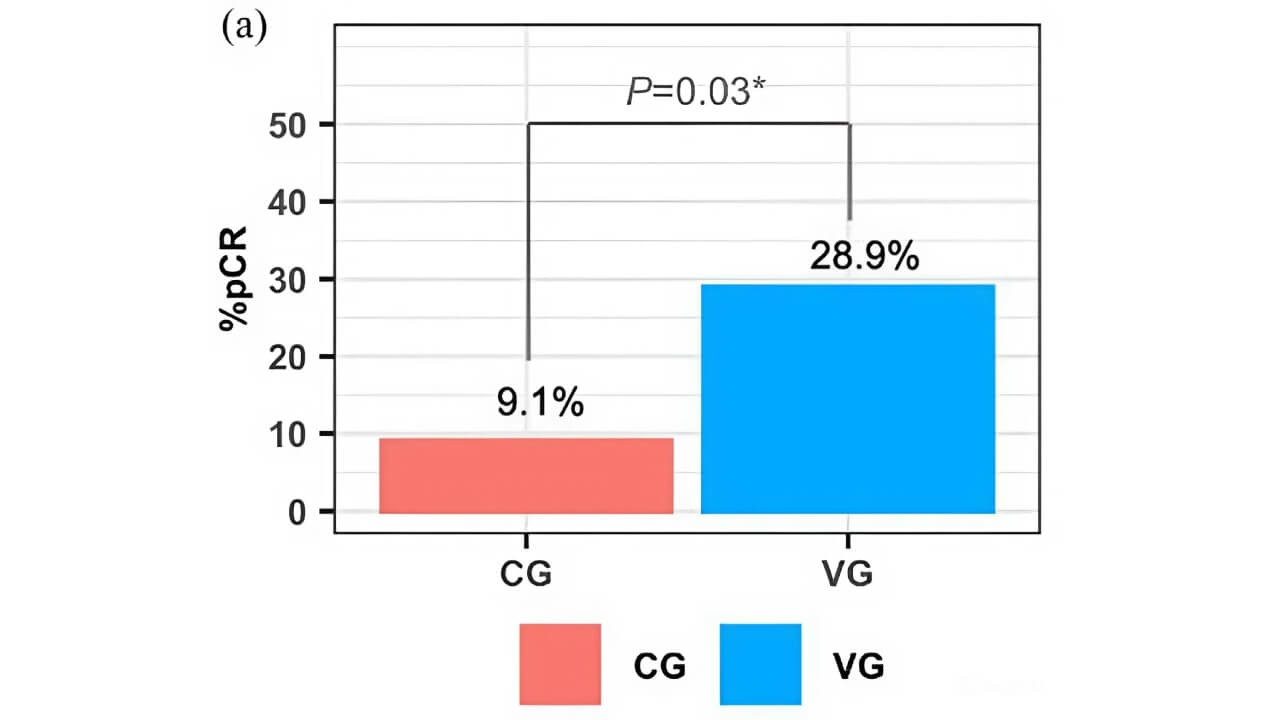
Immune memory and long-term monitoring. Here's what makes this therapy special. Clinical and preclinical studies show DC vaccines trigger strong responses from CD4+ and CD8+ T-cells – the immune cells that recognize and eliminate both primary tumors and metastases. These T-cells develop memory. They keep patrolling your body long after treatment ends, watching for any sign of cancer returning. This protection can last even after a single vaccination cycle. [6, 7]
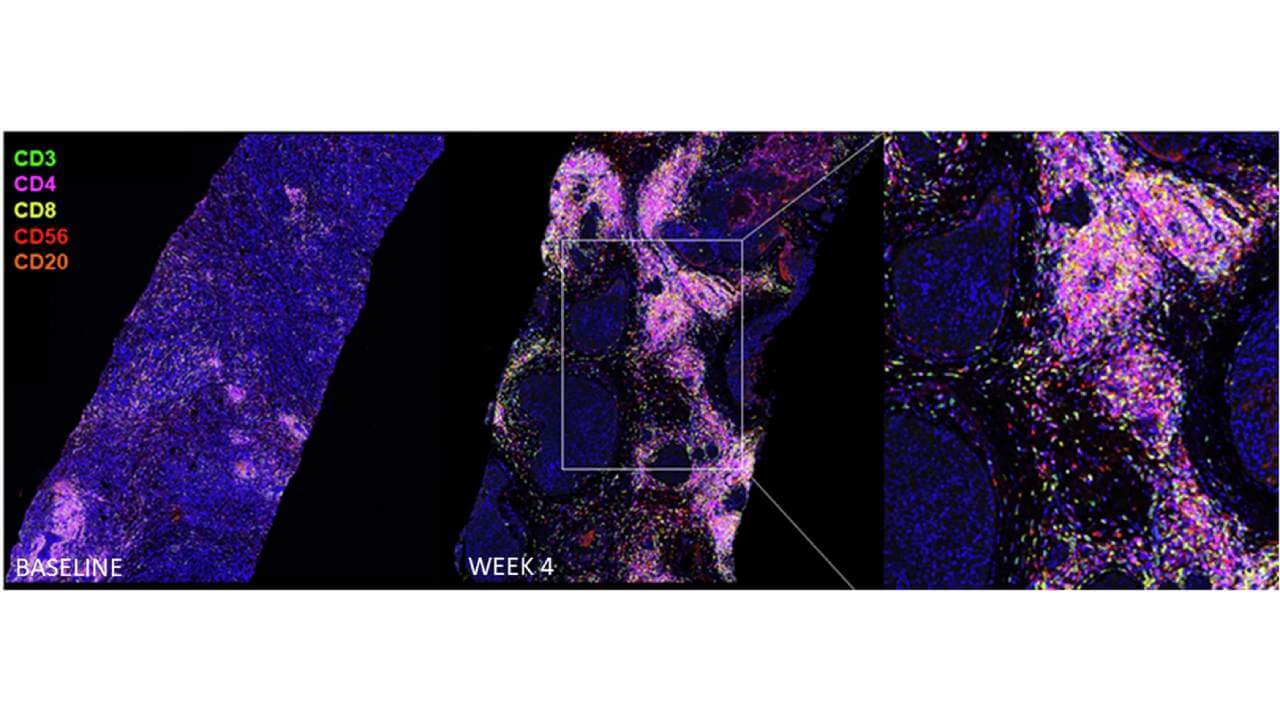
Effectiveness in metastatic disease. Advanced breast cancer poses unique challenges. But dendritic cell therapy combined with chemotherapy has shown real promise. A phase I/II study reported an objective response rate of 50% – double the ~25% seen with chemotherapy alone. For patients with limited options, these results matter.[8]
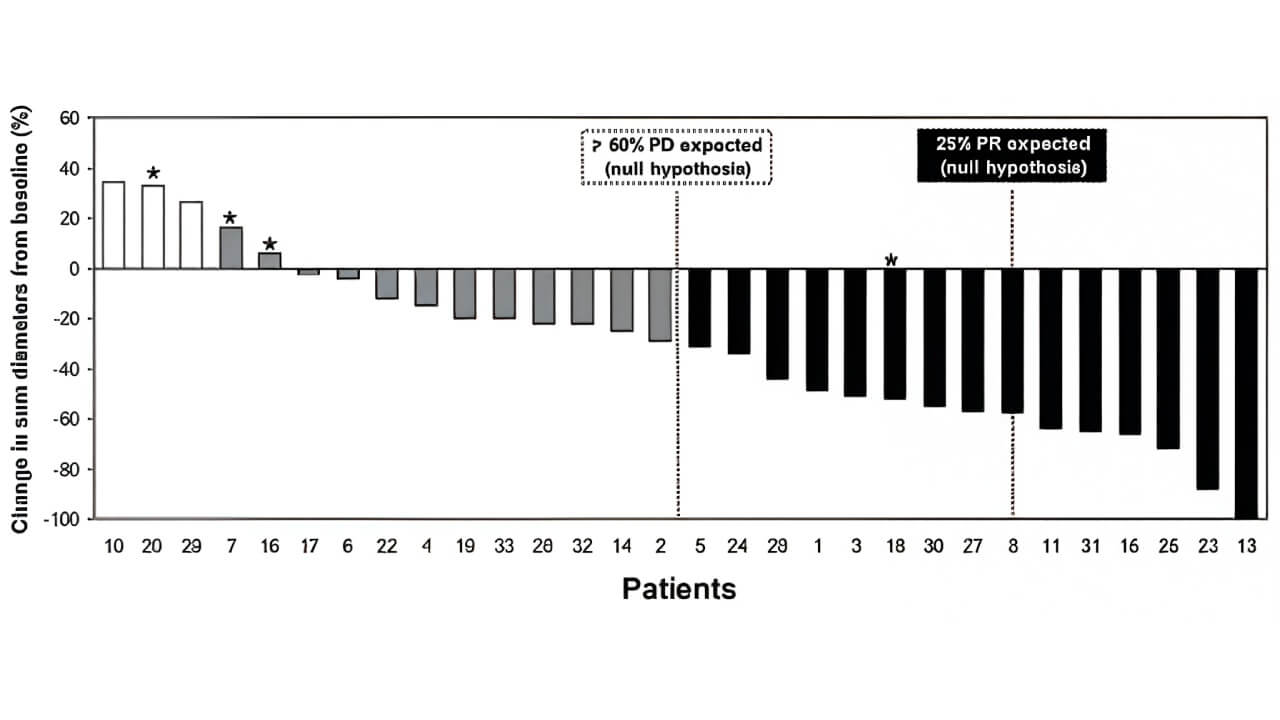
Patient Story: Huda's Experience with Dendritic Cell Therapy for Breast Cancer
Huda, from Saudi Arabia, faced advanced breast cancer head-on. Months of aggressive chemotherapy, radiation, and multiple rounds of targeted therapy – she endured it all – yet her cancer progressed anyway, spreading to her lungs.
Huda and her family searched internationally for new treatment approaches. That's when they discovered dendritic cell therapy at LDG Laboratories in Germany. She reached out to Booking Health for help with arrangements. The company coordinated everything: flights, appointments, logistics, which allowed Huda to focus on what mattered: her treatment and healing.
Finally, Huda arrived in Germany for dendritic cell vaccination. The difference from chemotherapy? Striking. No harsh side effects. No hair loss. No crushing nausea.
Within months, her tumor markers dropped. Imaging scans revealed something even better – the lung metastases were shrinking. Huda remains deeply grateful for the innovative therapy that halted her disease and for the compassion shown by Prof. Dr. Gansauge's team and Booking Health's coordinators.
Today? Huda continues her recovery, looking forward to the future with hope.
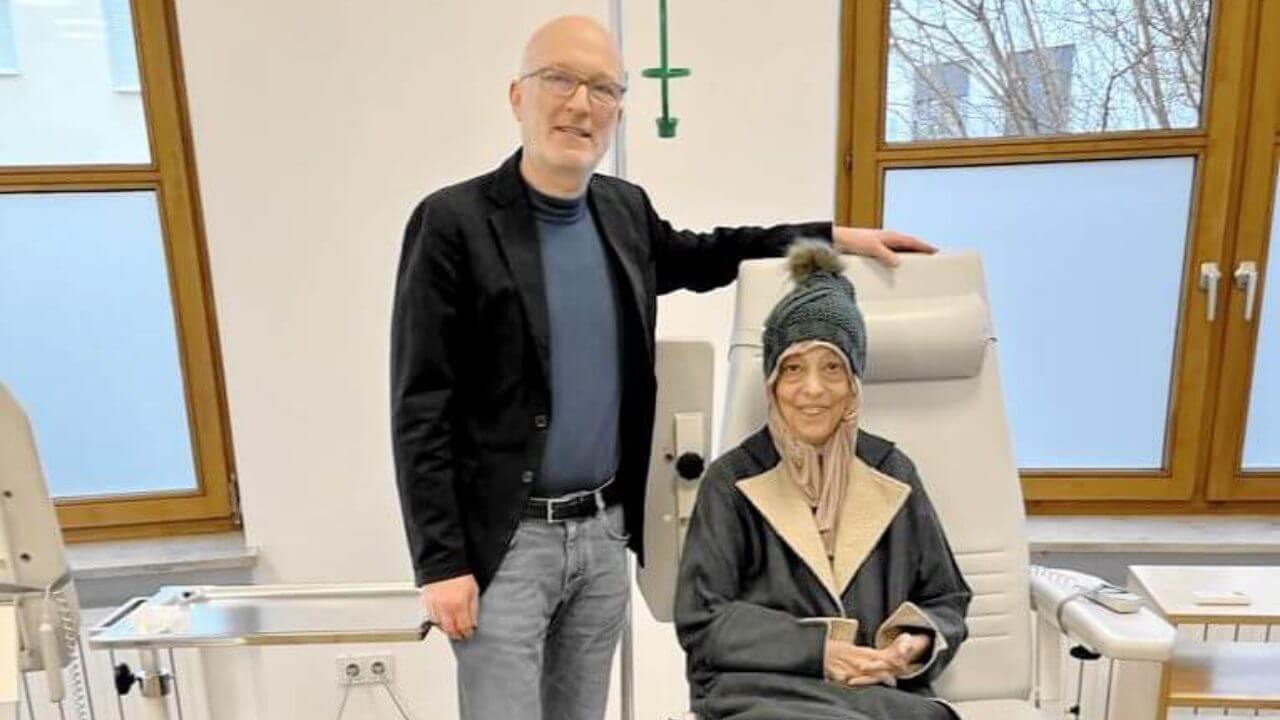
Leading Clinics for Dendritic Cell Therapy for Breast Cancer in Germany
Several immunotherapy centers across Germany have achieved great results in treating breast cancer. Below you will find three of them offering dendritic cell immunotherapy for both citizens and international patients.
LDG Laboratories – Dr. Gansauge, Berg. LDG Laboratories is led by Professor Gansauge. It is one of the most experienced and reputable centers specializing in dendritic cell therapy. As previously noted, the clinic has over 22 years of clinical expertise, with its own GMP-certified laboratory for vaccine preparation. Professor Gansauge's personalized approach includes genetic tumor profiling, custom antigen loading, and strict quality controls to maximize immune response.
Patients choose LDG Laboratories for individualized therapy protocols; innovative treatment for metastatic and hard-to-treat breast cancers; and extensive follow-up care and monitoring.
IOZK (Immuno-Oncological Center Cologne) is a famous healthcare facility that combines dendritic cell immunotherapy with virotherapy and hyperthermia for a multi-pronged cancer attack. In particular, the center is popular among international patients for its modern facilities and holistic care.
Main advantages of this clinic include its multi-modal immunotherapy programs and experience with a wide range of tumor types. It is also recognized for scientific research and innovation.
Praxisgemeinschaft für Zelltherapie, Duderstadt. This specialized practice offers cell-based therapies within a personalized outpatient setting. The Duderstadt clinic is known for its comfortable patient experience and integrative methods . It can be considered ideal for those seeking individualized attention in a peaceful environment.
Some of the benefits of this facility include personalized care in a low-stress setting and proven success in chronic and advanced cancers. It is trusted by cancer patients from around the world.
Send request for dendritic cell vaccination
Cost and Logistics of Breast Cancer Treatment Abroad
One of the most common questions that patients might have when considering breast cancer treatment abroad is about treatment pricing. We want to assure our readers that Germany offers dendritic cell immunotherapy at competitive prices – compared to many Western countries – without compromising quality.
What Is the Cost of DC Therapy in Germany?
The cost in Germany for dendritic cell therapy can be up to 50% lower when compared to U.S. or other high-cost regions. And this is essential for self-payers as the novel methods are often not insurance-covered. In Germany, may range between €20,000 and €38,000.
What affects the final cost, so? Whether therapy stands alone or is combined with surgery, radiation, or chemo. Additional treatments like hyperthermia or virotherapy – offered at centers like IOZK – also factor in. Your individual health status matters too. More complex cases require more resources.
A Medical Journey: Every Step of the Way with Booking Health
Finding the right cancer treatment – especially when dealing with advanced stages like metastatic breast cancer – can be overwhelming. After multiple consultations, exhausting treatment cycles, and conflicting medical opinions, many cancer patients find themselves confused by the sheer volume of information and uncertain about their next steps.
Instead of settling for standard protocols with harsh side effects, you can explore innovative, low-toxicity options like dendritic cell therapy. To make a truly informed decision, consult the experts at Booking Health – a company that has been organizing treatment abroad and international treatment coordination for over 12 years.
We specialize in personalized medical travel solutions, helping patients from over 70 countries access innovative therapies – including breast cancer immunotherapy – in Germany's top hospitals. When you choose Booking Health, you receive more than just a treatment plan; you gain a trusted partner to guide you through every stage of your healing journey.
Our services include:
- In-depth analysis of your medical records;
- Creation of a personalized breast cancer treatment program;
- Selection of the most appropriate clinic and specialists;
- Translation and forwarding of all necessary medical documents;
- Direct booking with the clinic (no intermediaries);
- Pre-travel consultations and preparatory support;
- Visa assistance, accommodation, and travel planning;
- On-site medical interpreter and personal coordinator;
- 24/7 support during your entire stay;
- Post-treatment follow-up and coordination of care after you return home;
- Transparent treatment pricing with no hidden costs.
Your health is one of the most valuable aspects of your life. Entrust it only to professionals with proven success and global recognition. Booking Health is your reliable partner for accessing world-class care and improving your quality of life.
Contact our medical consultants today to explore advanced immunotherapy options for breast cancer in Germany.
Dendritic Cell Innovation: Cancer Treatment with Booking Health
FAQ About Dendritic Cell-Based Immunotherapy In Breast Cancer in Germany
Send request for treatmentThis is a form of individualized immunotherapy. It uses patient's own dendritic cells to train the immunity to recognize and destroy breast cancer cells. What happens first? DCs are exposed to tumor antigens in a lab. What happens next? These trained cells trigger an immune activation process – teaching your immune system to recognize and destroy breast cancer cells specifically. A targeted approach.
Yes. It can enhance the immune response against tumors that have not responded to hormone or HER2-targeted therapies. Thus, DC vaccination for TNBC is a valuable option for a number of reasons.
Not entirely. Nevertheless, it is an effective immune-based worth-adding approach that works well as part of a more complex treatment plan.
Women with newly diagnosed breast cancer, those recovering after surgery, or women with advanced or recurrent disease. What determines eligibility? Your immune system function and tumor characteristics – specifically HLA status and antigen profile.
This approach is a personalized cancer therapy (and this matters most) with fewer side effects and longer-lasting protection. It is often preferred by patients due to good tolerability. Clinicians choose it because of lifelong anticancer immunity boosting.
In top immunotherapy centers in Germany, dendritic cell therapy for breast cancer involves blood collection, lab preparation of tumor antigens, and vaccine injection. All steps are simple and painless.
Expect €20,000 to €38,000. And what determines the final price, so? Your individual protocol, whether you need combination therapies, and which clinic you choose. More complex treatment plans naturally cost more.
Yes. In stage 4 breast cancer, dendritic cell therapy can stimulate the immune system to control metastatic breast cancer, prolong survival. Doctors often use it within a combination immunotherapy strategy – maximizing treatment effectiveness when patients need it most.
Certified immunotherapy centers are accessible through Booking Health support for international patients. Several leading cancer clinics in Germany, such as LDG Laboratories and IOZK, offer dendritic cell therapy for breast cancer.
Simple. Contact Booking Health directly. They manage everything – clinic selection, translation services, visa support, complete international treatment coordination. Your job? Focus on getting better. Their job? Handle the logistics and anything else stress-free.
Surgery is mostly used in the early stages, but in stage 4, it can help reduce the size of the tumor or eliminate local complications. The main advantage is the removal of the primary lesion (although the risk of local recurrence remains about 10–20%).
Chemotherapy slows tumor growth and is used for advanced forms of cancer. Сhemo often causes nausea, hair loss and a weakened immune system (up to 30% of patients have to stop treatment due to toxicity).
Radiation therapy helps reduce local recurrence after surgery or control symptoms of metastases (disadvantages include long-term skin damage and fatigue).
Hormone therapy improves survival in patients with hormone-positive cancer but does not work in triple-negative cancer (TNBC). Side effects include menopausal symptoms and mood swings.
Targeted therapy usually has mild side effects. Targeted therapy is highly effective in HER2-positive subtypes of breast cancer shrinking tumors and improving survival.
In Germany dendritic cell therapy for breast cancer is offered with individualized evaluation (tumor biology and immune status). Treatments are carefully monitored and integrated into standard oncology care. Also they are adjusted over time to enhance immune response and support overall disease management.
Choose treatment abroad and you will for sure get the best results!
Authors:
This article was edited by medical experts, board-certified doctors Dr. Nadezhda Ivanisova, and Dr. Bohdan Mykhalniuk. For the treatment of the conditions referred to in the article, you must consult a doctor; the information in the article is not intended for self-medication!
Our editorial policy, which details our commitment to accuracy and transparency, is available here. Click this link to review our policies.
Sources:
[1] World Health Organization. Breast Cancer. https://www.who.int/news-room/fact-sheets/detail/breast-cancer
[2] Da Qian, Jialu Li, Mingyao Huang at al. Dendritic Cell Vaccines in Breast Cancer: Immune Modulation and Immunotherapy. [DOI]
[3] Biomedicine & Pharmacotherapy. Dendritic Cell Vaccine for the Effective Immunotherapy of Breast Cancer. https://www.sciencedirect.com/science/article/pii/S0753332220302377
[4] Joanna Szpor, Joanna Streb, Anna Glajcar et al. Dendritic Cells Are Associated with Prognosis and Survival in Breast Cancer. Diagnostics (Basel). 2021 Apr 14;11(4):702. doi: 10.3390/diagnostics11040702. [DOI] [PMC free article]
[5] Marta Santisteban, Belén Pérez Solans, Laura Hato et al. Final results regarding the addition of dendritic cell vaccines to neoadjuvant chemotherapy in early HER2-negative breast cancer patients: clinical and translational analysis. Ther Adv Med Oncol. 2021 Dec 23;13:17588359211064653. doi: 10.1177/17588359211064653. [DOI] [PMC free article]
[6] Laura Hato, Angel Vizcay, Iñaki Eguren, José L Pérez-Gracia et al. Dendritic Cells in Cancer Immunology and Immunotherapy. Cancers (Basel). 2024 Feb 28;16(5):981. doi: 10.3390/cancers16050981.[DOI] [PMC free article]
[7] Springer Nature. A pilot study incorporating HER2-directed dendritic cells into neoadjuvant therapy of early stage HER2+ER- breast cancer. https://www.nature.com/articles/s41523-025-00742-x
[8] Chrystelle Brignone, Maya Gutierrez, Fawzia Mefti et al. First-line chemoimmunotherapy in metastatic breast carcinoma. J Transl Med. 2010 Jul 23;8:71. doi: 10.1186/1479-5876-8-71. [DOI] [PMC free article]
Read:
Dendritic cell therapy in cancer treatment in Germany - Vaccination against cancer
Article menu:
- Dendritic Cell Therapy for Breast Cancer – Mechanism of Work
- Indications for Dendritic Cell Vaccination in Breast Cancer
- Benefits of Dendritic Cell Breast Cancer Therapy Compared to Conventional Treatments
- Step-by-Step Process of Dendritic Cell Vaccination for Breast Cancer in Germany
- Professor Gansauge on Dendritic Cell Therapy for Breast Cancer
- Patient Story: Huda's Experience with Dendritic Cell Therapy for Breast Cancer
- Leading Clinics for Dendritic Cell Therapy for Breast Cancer in Germany
- Cost and Logistics of Breast Cancer Treatment Abroad
- A Medical Journey: Every Step of the Way with Booking Health
- FAQ About Dendritic Cell-Based Immunotherapy In Breast Cancer in Germany
Don't know where to start?
Contact Booking Health

